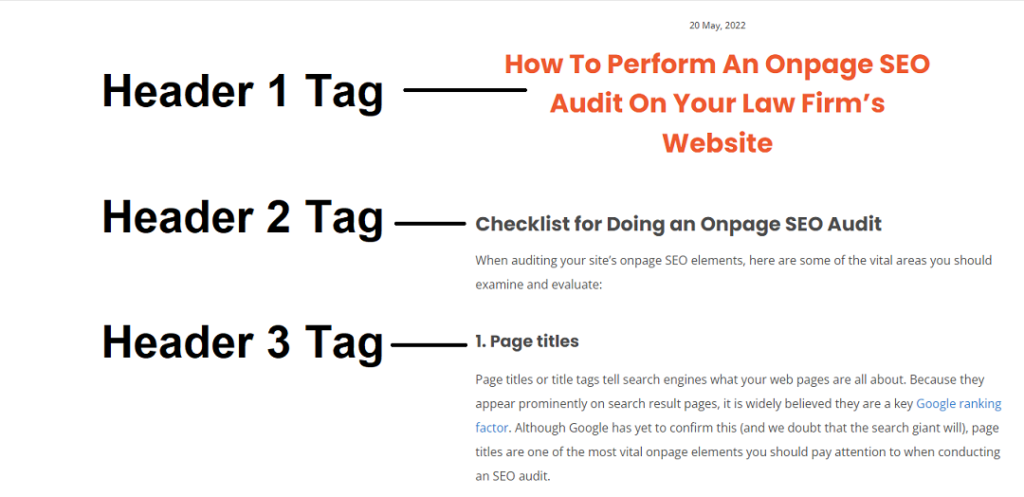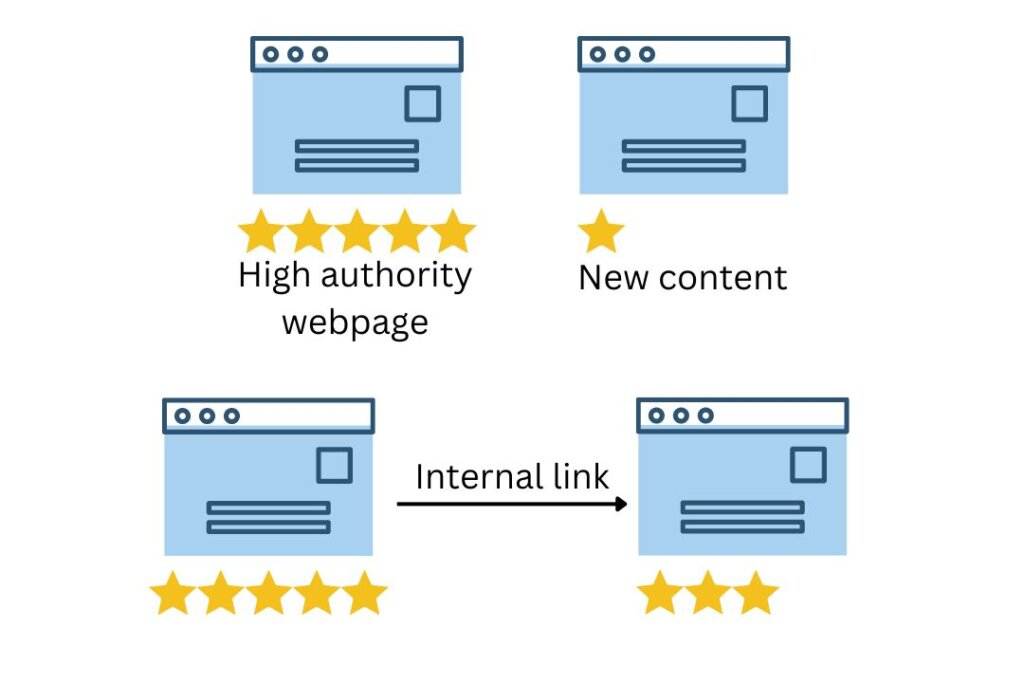How to Perform an Onpage SEO Audit on Your Law Firm’s Website
With many legal consumers using Google to look for lawyers they can trust, ensuring the SEO-friendliness of your law firm’s website is crucial. Being highly visible online makes it easier for potential clients to find you. But before you develop an optimisation strategy, first, you must conduct an onpage SEO audit.
Contents
Why Conduct an Onpage Audit
As the name suggests, an SEO audit is the process of evaluating your law firm’s website for potential onpage problems and errors that could prevent it from ranking on Google and other major search engines. Since every website is unique, performing an audit enables you to have a tailored view of how it performs from a search engine’s perspective.
An SEO audit is similar to preparing for a client’s case. You must do some preliminary research to determine the best course of action to improve your chances of getting a favourable outcome. Besides helping you obtain the results you want, an onpage audit enables you to:
- Avoid losing out on organic traffic and conversion opportunities.
- Gain a significant advantage over the competition.
- Ensure that Google correctly crawls, indexes, and renders your law firm’s website.
- Protect your site from potential Google penalties that could hurt your search rankings.
Checklist for Doing an Onpage SEO Audit
When auditing your site’s onpage SEO elements, here are some of the vital areas you should examine and evaluate:
1. Page titles
Page titles or title tags tell search engines what your web pages are all about. Because they appear prominently on search result pages, it is widely believed they are a key Google ranking factor. Although Google has yet to confirm this (and we doubt that the search giant will), page titles are one of the most vital onpage elements you should pay attention to when conducting an SEO audit.
When auditing your law firm’s site, see that your page titles:
- Are unique and present on every webpage.
- Contain relevant keywords.
- Have the appropriate length (about 50-60 characters).
- Are well-written and not over-optimised.
2. Meta descriptions
Meta descriptions are the text that accompanies page titles when they show up on search result pages. Similar to title tags, they let search engines know what a webpage is about. Although meta descriptions don’t directly contribute to your search rankings, they can help convince people to click through and visit your site when written well.
To optimise your meta descriptions, ensure they:
- Contain relevant keywords and engaging content.
- Are of the ideal length (about 100-155 characters).
- Are unique and present on every web page.
- Have a compelling call to action.
3. Web content
While your main goal is to satisfy search engines to boost your site’s visibility on search result pages, you mustn’t forget that you’re writing content for humans. Therefore, ensure that your web content matches user intent and provides value to your target audience. Also, while it’s essential to incorporate relevant keywords into your content, you shouldn’t overdo it. Otherwise, Google might slap your site with a penalty for being “spammy”.
Besides the ones mentioned above, here are other web content best practices you should remember:
- Avoid duplicate content across your web pages.
- Make sure your content is unique from those of other websites.
- Check your content for spelling and grammar mistakes.
- Break up long paragraphs into shorter ones to make them easier to read.
4. Header tags
While this is a no-brainer, our SEO experts at Kinetic Traffic have noticed that many law firm websites have web pages with missing header tags or headlines. This is a huge mistake since headlines are usually the first thing people see when they land on a webpage. Also, they help web visitors know they are in the right location and entice them to read further.
When auditing your header tags, see that:
- Each webpage has the appropriate header tags (H1, H2, H3).
- The headlines have relevant keywords.
- They are compelling and enticing enough for your web visitors to take your desired conversion action.
5. Internal links
Internal links help search engines determine the relationship between related web pages. They also help pass link equity and are crucial in developing authoritative hierarchies within your law firm’s website.
Here are several pointers to remember when auditing internal links:
- Link new content to a page that has built equity or authority over time.
- Always consider user experience and information architecture when creating internal links.
- Ensure your internal links are always pointing to relevant content.
6. Website structure
You’d want to have specific pages for each core keyword or pillar topic you wish to target. Because Google wants to provide web users with the most relevant search results, having a dedicated page for each of your core keywords will make it easier to obtain higher search rankings.
When performing an onpage SEO audit of your site’s structure, ensure that:
- You have a dedicated landing page for each service, location, or area of law you specialise in.
- Your landing pages are integrated into your site’s structure and information architecture.
7. URLs
Your site’s URLs should be brief but descriptive to make it easier for search engines and your target audience to know what your web pages are all about. Also, ensure that your pages only use and load on one URL format. For instance, you don’t want your homepage loading at both http://www.yourlawfirm.com/index.php and http://www.yourlawfirm.co.uk/index.html since Google considers those as two separate pages. Instead, you should have one URL automatically redirect to the other.
For URL best practices, follow these tips:
- Incorporate relevant keywords into your URLs.
- Edit your URLs to feature words instead of random letters and numbers.
- Try to keep your URLs short and simple.
Always Start Your Campaign with an SEO Audit
An SEO audit helps lay the foundation for a strong optimisation campaign. Therefore, see that you evaluate your website’s strengths and weaknesses and the potential problems affecting its health before devising an SEO campaign. This will help ensure the success of your optimisation strategies and boost your chances of getting the results you’re expecting.
Don’t have the time to conduct a site audit? We are happy to help! At Kinetic Traffic, we specialise in law firm SEO and Google Ads to help lawyers and solicitors take advantage of the opportunities Google and other major search engines can offer. Contact us today for a free SEO audit.
Lead your law firm towards the best results.
Get in touch with our team and let’s talk about your marketing needs.












